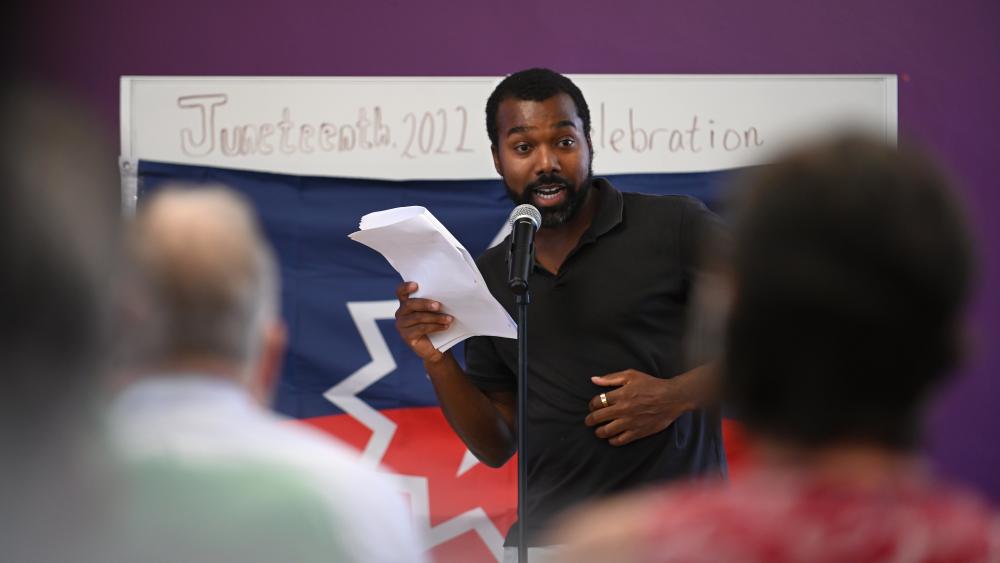Dominican Marks Juneteenth With Picnic, History Presentation

(Photo: Dr. Irvin Hunt, an assistant professor of English and African American Studies at the University of Illinois, Urbana-Champaign, speaks on the history of emancipation and early celebrations among Black Americans during a Juneteenth event in the Center for Cultural Liberation).
Dominican University celebrated Juneteenth for the second consecutive year with an outdoor picnic and a guest speaker providing a history of the holiday commemorating the emancipation of slaves in America.
The event, held June 17, included games, music and the Gourmet Grill on Wheels food truck on the Quad.
A diverse crowd of approximately 100 students, staff, faculty and families dropped by to participate in the celebration, said Amy Omi, project coordinator with Dominican’s Office of Diversity, Equity and Inclusion, which hosted the activities with the Center for Cultural Liberation and Truth, Racial Healing and Transformation.
The decision to mark Juneteenth with special events came last year following the designation of the day as a federal holiday and discussions among groups on campus, Omi said.
“We really wanted this to be a moment of real joy and celebration, the community coming together,” she explained.
The commemoration of Juneteenth also has a greater purpose.
“We’re looking at the past, reckoning with the past, and reimagining what our future can look like,” Omi said. “For me, it’s part of a much larger movement and this is just one piece of that: A moment of joy and celebration in the midst of very challenging work of structural change addressing racism and dismantling white supremacy culture.”
Olivia Haynes, an incoming junior at Dominican and a student coordinator for the Center of Cultural Liberation, said she hopes Juneteenth serves as an opportunity for more people to learn about the reason behind the holiday.
“I think it’s really exciting and also important for the university to acknowledge this event and have people come together to celebrate,” she said.
Following the picnic and outdoor bash, Dr. Irvin Hunt, an assistant professor of English and African American Studies at the University of Illinois, Urbana-Champaign, spoke to a packed room in the Center for Cultural Liberation, sharing “the truth behind the myths” of Juneteenth’s origins and how it represents a series of days connected to emancipation, not just the single day in 1865 when a general order informed the residents of Galveston, Texas that all slaves were free.
“When I think of Juneteenth … I think of all the versions of this day that testify not to when Blacks realized they were free, but when whites decided to protect that realization,” Hunt told the audience.
Hunt shared testimonials of former slaves recalling their reactions to learning of the end of slavery and he presented photographs and newspaper clippings of past “Emancipation Day” parades and ceremonies at the turn of the 20th Century. Many family gatherings included red soda water, described by Hunt “as essential to Juneteenth as fireworks are to the 4th of July.”
Hunt explained that freedom was a slow process, with the 1863 Emancipation Proclamation not being enough to officially end the practice of slavery in many places. The June 19, 1865 order issued in Texas by General Gordon Granger — advising citizens that slaves were now free and establishing what became known as Juneteenth — wasn’t even the final word on emancipation and has generated its own share of factual inaccuracies and omissions, Hunt said.
The language of the order was also patronizing to the formerly enslaved, advising them not to leave their former owners and warning that they would “not be supported in idleness.”
Hunt noted that celebrations of Juneteenth declined in the 1970s, only to grow again following periods of racial violence, such as the beating of Rodney King by police officers in 1991.
“This wouldn’t be a national holiday today without the murder of George Floyd and the movement for Black lives,” he said.
“The answer usually given to how we pair moments of Black celebration with moments of horror is that we are taking one step forward, only to take two steps back,” Hunt added. “But that answer presumes we are all trying to step in the same direction when, maybe all along, we’ve trying to find different ones.”